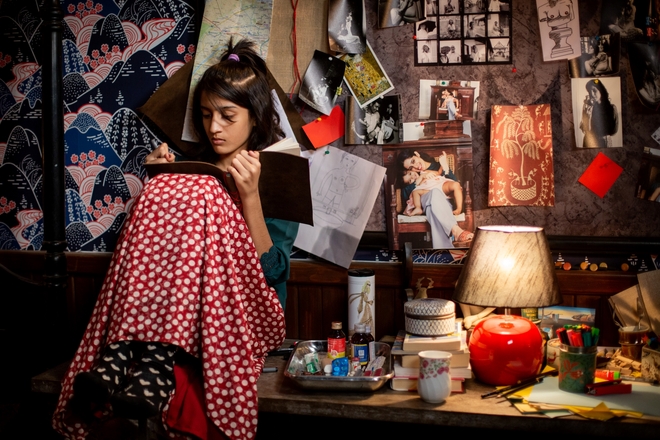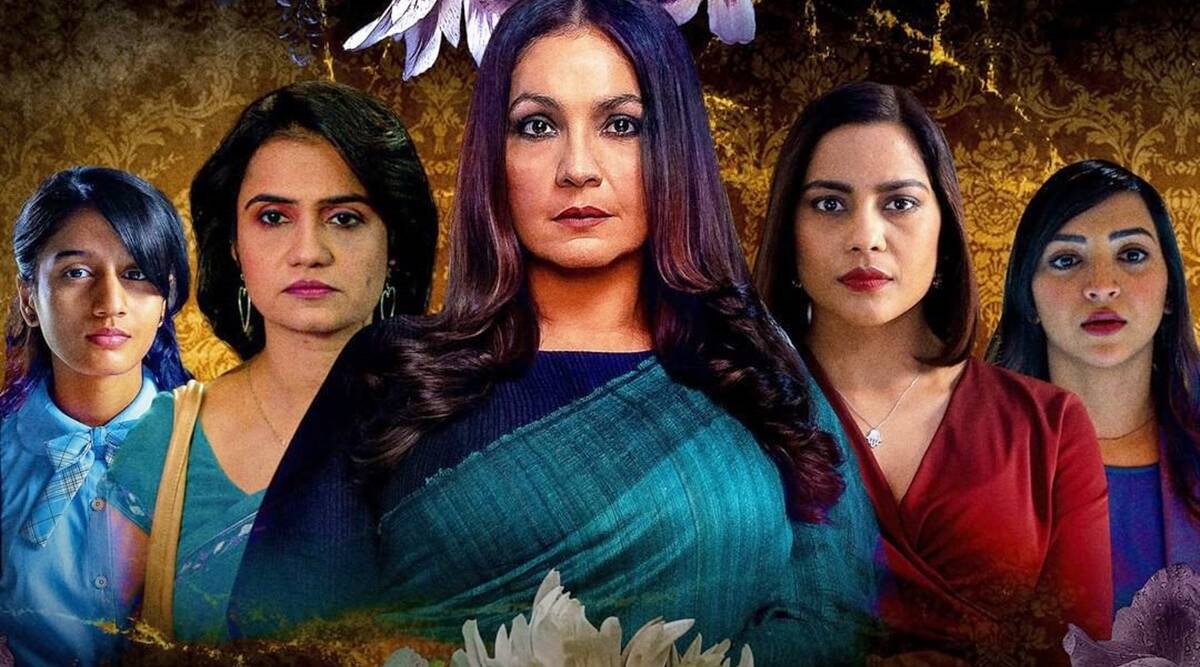Through a 13-year-old’s voiceover (Shai, played by Aadhya Anand), directors and screenwriters Alankrita Shrivastava and Bornila Chatterjee underline the narrative of Bombay Begums placing Rani (Pooja Bhatt), the newly appointed CEO of the fictional Royal Bank of Bombay in the centre, while her life collides with the other three protagonists in and out of the bank.
A story that bounces between adolescent and menopausal women from different socioeconomic backgrounds of Mumbai seems to hook the audience onto Bombay Begums, a Netflix Original launched on International Women’s Day, depicted across six episodes within more-or-less six hours. The impact and narration, however, is filled with holes and loopholes. Some of the twists and turns leave the audience wondering “what just happened” while others are way too obvious, made all the more insufferable by the repetitive voiceover and reiteration of the same. What could have been a tale of 5 strong women’s strive to success, it rather becomes a story of misused power and privilege, manipulation, envy and contestation.
The story and characters alone are too full of underlying intricacies to have the audience grapple over the visual effects and other nitty-gritties of the drama.
First off, the casting of the leads: this is one major area where the show could have gotten very wrong, but honestly, the only thing that (probably?) saved it: Pooja Bhatt as Rani was perfect given her voice, acting, age and demeanor; you could see her fulfill the namesake (Rani- Queen).
Shahana Goswami as Fatima, a highly ambitious, complacent woman going through a tumultuous relationship with her child-obsessed husband- delivers a fall-from-grace that was too disturbing to entertain, while Plabita Borthakur’s Ayesha was a perfect millennial small-town girl with big dreams, as demanded of her. Finally, we have the two powerful acts – Amruta Subhash’s Lily, a bar dancer turned sex-worker who is also a single mother, and Aadhya Anand as Shai, a pre-pubescent teens dealing with middle school drama while recovering from her mother’s death.
Plot
While Shai is our youngest character, we hear more of her words than we get to see her act upon; while she doodles away her battles with her mother’s death and father’s remarriage, her teenage angst and immaturity is sidelined by the kind of stories her narration figuratively depicts. We don’t see much of the development until she gets caught up in the wrong crowd after her first heartbreak.
Out of the five leads, the one you will find yourself rooting for most is probably Ayesha: she faces unnecessary drama with a #metoo case, whilst already dealing with nomad syndrome after losing her house-rental overnight and being queer. Fatima fires her over a silly overdraft but she is soon re-appointed by Rani in social welfare schemes to help Lily start up her own business as a hush-scheme to save her stepson Zuravar, whose car crippled Lily’s son after his little rendezvous at the red-light district.
Rani, the queen bee, is seen struggling for her husband’s love as he ponders over the memories of his ex-wife and finds herself in the arms of a younger alpha (Rahul Bose) whose presence is more than a little beneficial to her personal and professional lives. Fatima, who Rani thought would be her pawn, is constantly indecisive in the way she acts; the show deals with the struggles of a couple longing for a baby in the light of infertility, surrogacy and work-life balance, but it fails to reflect on Fatima’s true feelings regarding all of it. So much so, after her miscarriage, she is shown to express zero empathy toward her husband’s breakdown or further wishes to continue the stride to becoming parents- she rather gets involved in an extra-marital affair unregretfully.
Things amiss, things I miss

Every plot twist that the story offered, felt predictable.
It wasn’t a surprise that Ayesha’s little dream world with Chitra will only remain one-sided, or that Deepak’s case would eventually call the bank to its graves; there wasn’t much room for improvement in Fatima and Arijay’s (Vivek Gomber) marriage although the latter seemed to have made a massive growth in accepting his wife’s career and pursue raising the child as a house-husband- an effort Fatima quite blatantly declined.
Haider’s entry and Lily pushing him to take her to Dubai was quite unnecessary because up until that point she had made it quite clear she needed no man to raise her son, which she even mentions in a heated argument with him – “your father never spent a penny”- although it can be assumed that the father indeed, is Haider, the show deliberately- or for whatever inexplicable reason, avoids mentioning. Moreover, the political angle despite the existing conflict regarding Lily’s former profession was another unnecessary pint of additions in the saturated mix.
Shai struggles with a delayed puberty- understandable- but there other aspects of her life that remained completely unexplored, like her relationship with her father, or how her mother actually died, and especially her artwork: the fact that she had a talent beyond being tangled in teen and family drama are core personality traits that are hardly talked about. Her abusing substance at a kids’ birthday party, no matter how orientally-appropriate, even for Netflix- was a bit much. Secondly, the writers’ efforts to break the cycle of victim-blaming was also problematic as they painted a picture of Ayesha being into Deepak from the beginning, almost convincing the audience that sexual favors indeed lead to job promotions.
Eventually, the only person we see growing out of the power struggle and the bubble of begumness is probably Rani herself, who risks her career and openly speaks up about her assault and admits to hiding the cases of her employees for the sake of goodwill, opens up to and resolves issues with Shai, comes clean about her affair and ends it fully.
Hit and run

The writers, in my opinion, were trying to sell unconventional women, women who are considered “bad”, from the slum to the upstate, they were trying to gather sympathy and a back story that would challenge the patriarchy. Something as such, coming out on the occasion of International Women’s Day would probably have been an impactful debut, if the story had not been so complicated; the depiction made it almost pointless, trying to oversell everything in such a clumsy way. Womanhood is simpler than this; wanting to be accepted should not be such a battle. Although there were scenes where Pooja Bhatt’s (Rani) eyes had a more powerful role than anything in the script itself, her acting alone could not salvage the fall.
The show is six hours and six episodes long, and is binge-worthy with the never ending drama. However, it does leave a lot unanswered and ends at a cliff-hanger, as Deepak testifies against Rani, the government announcing an investigation into the Royal Bank of Bombay, Ayesha finds a new home and Lily starts her own business, and Fatima finds herself loveless and grappling for validation as both her lover and her husband strand her in the vast city of Mumbai. After Rani put Shai’s notebook back together, is she going to follow through the advice of her step-mother and continue her art, or will hitting puberty guide our little narrator in a new direction?
As for whether this controversial venture be picked up for another season is another question. Should you still watch it? Yes, if you want to spice up your life with drama that’s not yours and participate in the “I’m not like other girls” conversation with your school buddies.







